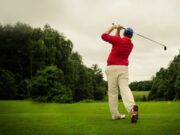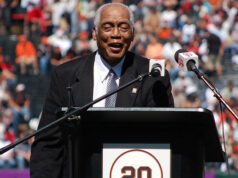by Mitch Lyons
If you are involved in organized youth or school sport in any capacity, you have one of two choices that you can make:
- You may keep the current and traditional team model where children focus on sport-specific skills, with ambiguous life skill messages taught verbally, varying from team to team, or;
- You may try to change the team model to one where children learn from a structured, written curriculum that teaches life-long, self-worth building mental skills as the focal point of the team, using sports as an educational vehicle.
The choice is yours. Just as we tell athletes, we can work hard to be better – or not. The choice is ours.
Recently, the Newton Public Schools of Newton, Massachusetts made the choice when they funded the first program in the country to implement a written sports psychology curriculum on its sports teams. At Newton North High School, (pop.2200), coaches and kids are attending a hour and a half workshop, reading a simple, straightforward text, taking a quiz on it, filling out a mid-season evaluation form and, most importantly, practicing mental skills every time the team meets. In addition, this large school is plastered with flyers declaring what the Performance Psychology Culture is at Newton North – building self-worth through the skills of hard work, creating a positive environment, proper goal-setting, visualization, meditation practices, task-orientation, recognizing harmful thoughts, positive self-talk and imagery. Most parents would opt for teaching long-lasting development for their children as the focal point of their team, if they knew there was a choice. There is.
Maybe you think that the manner in which youth and school sports is taught and learned is fine. From personal experience as a coach and watching my two kids go through the system and go on to make their college basketball teams, I know that it can be a lot of fun just as it is. However, since there is so much time spent between coach and player, shouldn’t we put the effort into improving the experience, not only for the elite athlete, but for the 95% participating who are not part of the elite?
Newton is an affluent suburb of Boston, but the program is also at Cathedral High School in downtown Boston’s South End. This small, inner-city Catholic school (pop. 300) has followed Newton’s example, despite their being so dissimilar in almost all respects, except that both Athletic Directors were thinking about how to improve the system, were presented with an opportunity to make a choice, and made the choice when they saw it was a good thing for their students. Other high schools are also poised to take the same action, pending funding to train additional facilitators. There are clearly not enough sports psychologists and psychiatrists to deal with the vast numbers of children who play organized sports nationally every year, but there is no reason why all children and coaches cannot practice very basic skills regularly for personal growth. As a bonus, their athletic performance may actually improve.
The Massachusetts Interscholastic Athletic Association (MIAA) has adopted the program as part of their award-winning, state-wide Wellness program. Doctors, educators, athletic directors and people from all backgrounds support this creative concept. This movement is nascent, but quite healthy due the very simple logic of this educational initiative.
Why are we interested in changing the traditional verbal model of sports teams? Because it makes educational sense. The curriculum is based upon sport psychology, a body of knowledge that has grown exponentially in the last two decades. We write down our curriculums for academic subjects because what we teach kids matters. What kids learn in sports matters as well. Written curriculums provide a standardized education for each child so we know what they will be learning. If implemented, a written curriculum takes the “luck” factor out of what type of experience children will have on a team. With a written curriculum based in sport psychology, all players, starters and non-starters, are striving for personal progress and trying to re-define success in those terms. With a written curriculum, coaches will eventually conform to one of the basic tenets of sport psychology, e.g. “people perform better in a positive environment”.
The mental skills taught are simple and reflect most of the mistakes people make in sport. More importantly, they are transferable skills that mirror our community values. A sports team offers a place to practice these skills (in high school on a daily basis). As a result, the athletic program becomes an applied mental training program, using sports as a fun way to learn. Lastly, the skills support the premise that people who feel good about themselves as people, perform better in anything they do. Students are given specific exercises to improve the following self-worth building skills:
- Be positive with others because people perform better in a positive environment.
- Be positive with self as what a person thinks effects the quality of their performance.
- Work hard as it makes people feel good about themselves when they do.
- Focus and recognize when thoughts stray so our chance of success is better.
- Set proper goals that assist in attaining success daily.
- Concentrate on the details of a task, not the outcome, for better results.
- Visualize successfully completing a task to improve chances of success.
- Meditate to control your thoughts, feelings and actions.
In the Journal of Applied Sport Psychology (“Conceptualizing Excellence: Past, Present, Future” p. 140, September, 2002), authors Patricia S. Miller and Gretchen A. Kerr, offer an “Athlete-Centered Sports Model.” Advocates of this model maintain that “performance excellence is thus made possible only through personal excellence.” They continue, “performance goals are only one of a myriad of important objectives. In this way, athletes develop as athletes, but also as contributing members of society.”
There is estimated to be 29 million children nationally playing organized sports annually. Practice visualization now by seeing a day when 29 million children are growing up practicing the mental skills that make people successful. We can make the choice right now. Aren’t these skills what we want children to learn?
Mitch Lyons is a president and founder of GetPsychedSports.org,, a 501(c)(3) non-profit Massachusetts corporation, which can be found at www.getpsychedsports.org. Mr. Lyons is not a psychiatrist or psychologist, but a coach of youth, school and college sports for 17 years. He is currently an Assistant Coach for Lasell College Men’s Basketball Team in Newton, Massachusetts. He practiced law for 26 years before retiring to try to make positive change in youth and school sports.













